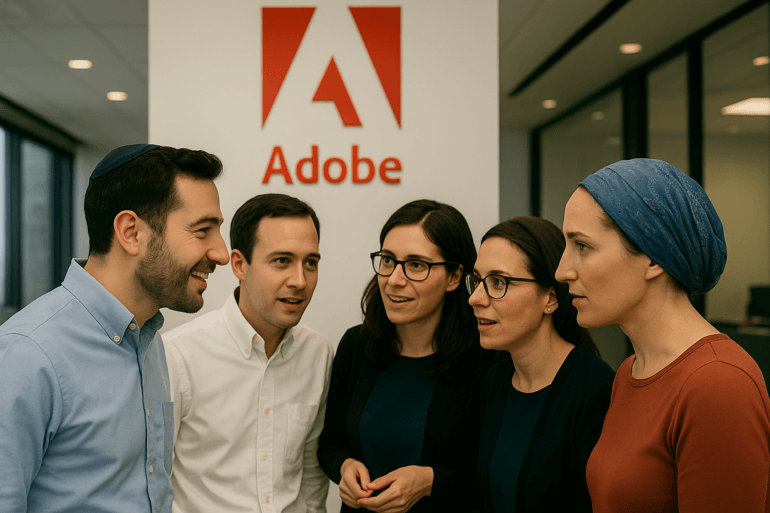
Adobe Just Recognized a Jewish ERG. Here’s Why That Matters So Much Right Now.
In a time of rising antisemitism and increasing workplace hostility toward Jews, a quiet but powerful milestone was achieved inside one of the world’s most recognizable tech companies.
Earlier this month, Adobe officially recognized a Jewish Employee Resource Group (ERG)—a decision that’s being hailed as a breakthrough for Jewish representation in the workplace.
ERGs, or Employee Resource Groups, are internal, employee-led collectives that allow workers to organize around a shared identity—such as ethnicity, race, or sexual orientation—and often receive formal support and recognition from their employers. But for Jewish employees, whose identity is both religious and ethnic, gaining that recognition has often been far more complicated.
“Jewish identity is not strictly religious—it is also ethnic and rooted in our shared ancestry, our common history, our common languages,” explained Rory Lancman, Director of Corporate Initiatives and Senior Counsel at the Louis D. Brandeis Center for Human Rights Under Law, which supported Adobe’s Jewish employees through the process. “They are people who are ethnically Jewish without necessarily being religiously observant,” he added. “And of course, that aspect of Jewish identity deserves as much recognition—and is recognized—by the law.”
Lancman refers to Title VII of the Civil Rights Act of 1964, which protects Jews as both a religious and ethnic group. But in practice, many companies fail to apply that standard—treating Judaism solely as a religion, rather than the multifaceted identity it is. When even basic gestures—like placing a menorah next to the office Christmas tree, acknowledging Jewish American Heritage Month, or avoiding major meetings on Yom Kippur—are overlooked, it signals to others in the workplace that Jewish identity doesn’t warrant the same respect or consideration.
The result? “It’s a signal to other employees who might harbor antisemitic views that a certain amount of open season is available to them on Jewish employees…to say and do things that would be inconceivable if they were said or done about other ethnic identities in the workplace.”
That climate has only worsened in recent months.
“Every group of employees that reaches out to the Brandeis Center is doing so because there is a problem of antisemitism in their workplace,” Lancman said. “And they want the tools that an ERG provides to address that antisemitism. It could be that the internal communication channels are often flooded with antisemitic, anti-Israel, anti-Zionist messaging…or there are posters and paraphernalia about opposing Israel…glorifying violence against Jews in the Jewish state.”
Adobe’s decision stands in sharp contrast to Microsoft’s reported refusal to grant the same recognition—despite hosting ERGs for other ethnic or racial groups. It also follows a painful period of silence from many companies after the October 7th massacre in Israel.
“Corporate America disastrously failed to step up and offer the sort of unqualified, unequivocal support for its Jewish employees and the trauma that they were going through—on anything remotely like the scale and intensity that was offered for other communities going through other traumas,” Lancman said, citing examples like the war in Ukraine and the Black Lives Matter movement.
What makes the Adobe story particularly meaningful, he added, is that it wasn’t adversarial.
“Adobe and its Jewish employees really wanted to do the right thing for each other,” Lancman said. “There were bumps, but…nobody had to have their arm twisted. Nobody had to compromise something that was an important value to them.”
Because of Adobe’s size and visibility, the decision sets an important precedent. “The fact that Adobe is such a giant company, is such a well-known brand…puts pressure on the rest of corporate America to do the right thing also.”
For Jewish employees at other companies who want to organize but don’t know where to start, Lancman has a simple suggestion: “Start talking with your Jewish colleagues one-on-one…start building common ground with common objectives. And when they reach a critical mass, they should give me a call. And we’ll help them out.”
In an era when many DEI initiatives exclude or misunderstand Jewish identity, Adobe’s decision stands out as a model for meaningful inclusion. It sends a clear message: Jews belong. Their identity—whether expressed through religious observance, cultural connection, or both—is worthy of recognition, dignity, and respect.
If you found this content meaningful and want to help further our mission through our Keter, Makom, and Tikun branches, please consider becoming a Change Maker today.







